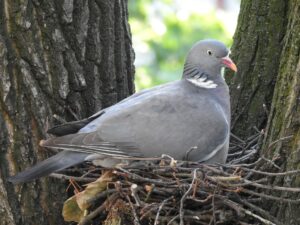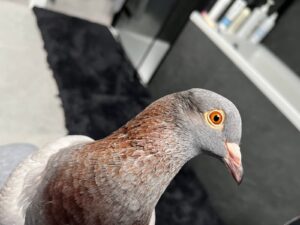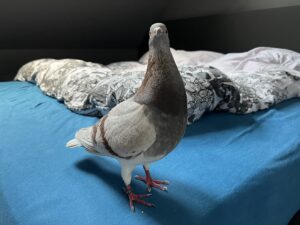As a proud pet pigeon owner, I’m often asked all sorts of fascinating questions about these wonderful birds, but one that consistently pops up is: “Do pigeons lay eggs?” The simple answer is yes, pigeons, like most birds, do lay eggs.
Understanding the egg-laying process of pigeons is not just an interesting fact about their life cycle. It is also vital information, especially if you’re a pet pigeon owner, a breeder, or someone simply curious about birds.
It helps us provide the right care, should our feathery friends decide to start a family of their own, and deepens our appreciation for these remarkable creatures.
So, let’s dive deeper into the world of pigeon reproduction.
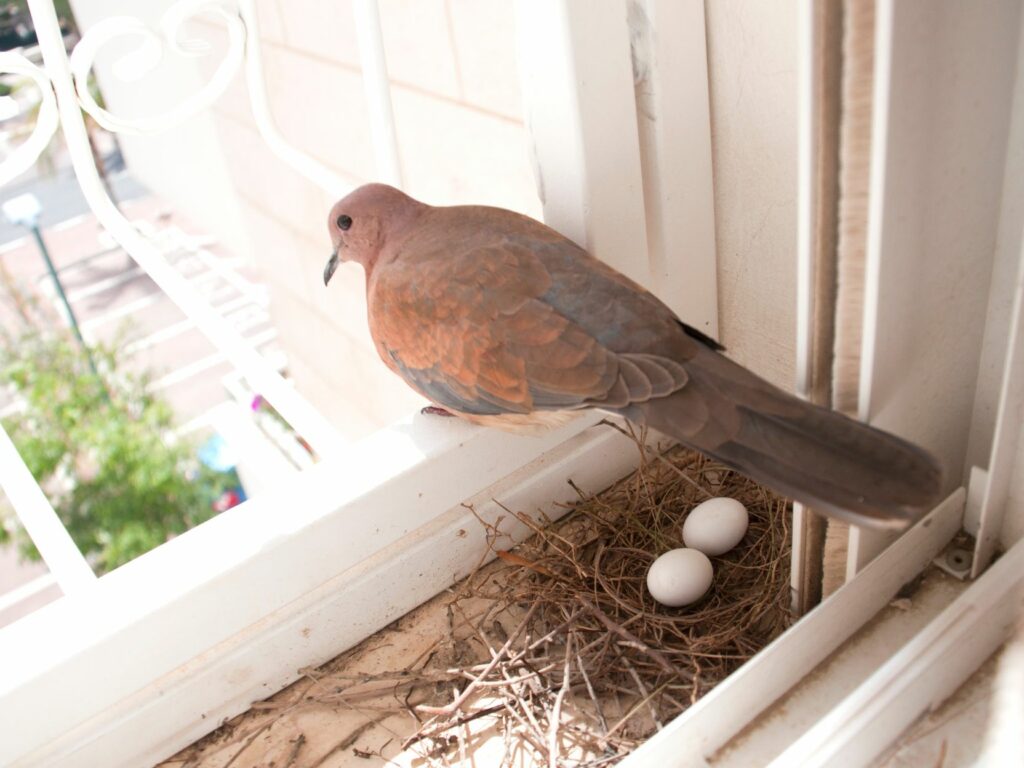
Do pigeons lay eggs?
Do pigeons lay eggs? TL;DR
Yes, pigeons do lay eggs as part of their reproduction process. After mating, a female pigeon typically lays one or two eggs, which both parents then take turns to incubate. Pigeons can breed year-round, though spring and summer are the most common seasons. They make their nests in a variety of places, from city buildings to natural cliff ledges, and can breed multiple times per year.
The pigeon reproduction process
Pigeons, just like any other bird species, go through a systematic series of events from mating to egg-laying in order to reproduce.
Mating Rituals and Copulation
Before the physical act of reproduction, pigeons engage in complex mating rituals that involve a fascinating dance of attraction and selection.
The male pigeon typically initiates the process by puffing out his chest and cooing loudly to attract a female. He also performs a unique dance, bowing and turning in front of the female to show his fitness and suitability as a mate.
Once the female accepts his advances, the two birds engage in copulation, with the male mounting the female to deposit his sperm, which will fertilize her eggs.
Check my entire article on pigeon reproduction: How Do Pigeons Reproduce?
The Role of Egg-Laying in Pigeon Reproduction
Egg-laying is a pivotal phase in the life cycle of pigeons. This stage, which follows the successful mating and fertilization, sets the groundwork for the birth of the next generation. Below are some expanded points about the process:
- The Number of Eggs: A female pigeon, once her ova have been fertilized, typically lays one to two eggs. This small clutch size is quite standard for pigeons and it allows both parents to adequately warm and protect the eggs.
- The Nest: Pigeons build relatively rudimentary nests compared to some other bird species. These nests, often made from small twigs and other available materials, are usually located in high and safe places to protect the eggs from predators and harsh weather conditions.
- Incubation: Both the male and female pigeon share the responsibility of incubating the eggs. This shared responsibility ensures that the eggs are constantly kept at the right temperature, essential for the embryos’ development. The incubation period lasts for around 18 days.
- Hatching: The successful hatching of the eggs marks the conclusion of the pigeon reproduction process. When the chicks, known as squabs, emerge from their eggs, they are blind and featherless and completely reliant on their parents for survival.
- The Early Life of Squabs: For the first few days, the squabs are fed a substance called ‘crop milk’ by their parents. This highly nutritious food helps the chicks grow rapidly, and within a month, they are usually ready to leave the nest.
The period of egg-laying, incubation, and early life is a fragile time in the pigeon’s life cycle. It’s a time when the birds are most vulnerable to predators, disease, and harsh weather conditions. As such, the parental role in this stage is crucial for the survival and success of the next generation.
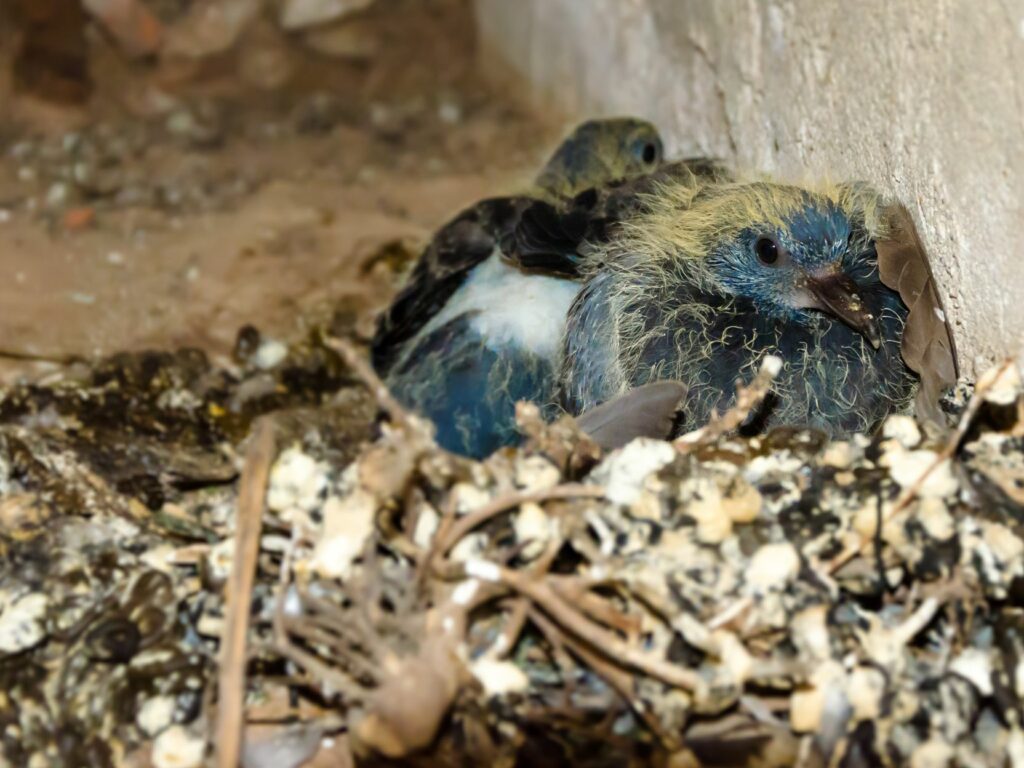
The Pigeon Egg-Laying Process
The process of pigeon egg-laying is a remarkable aspect of their life cycle that offers unique insights into their behavior and adaptability.
Where and When Do Pigeons Lay Eggs?
Pigeons aren’t too picky when it comes to their nesting sites. You might find pigeon nests tucked away in various nooks and crannies around cities, such as in lofts, under bridges, or on window ledges. They’ll even nest on balconies or in garden sheds. Pigeons in more natural environments favor ledges on cliffs, in caves, or on tree branches.
The timing of egg-laying isn’t set in stone either. Pigeons can breed year-round, although spring and summer are the most common seasons due to the abundance of food and milder weather. Each pair of pigeons can breed several times per year if conditions are suitable, meaning a pigeon could be laying eggs at any time of the year.
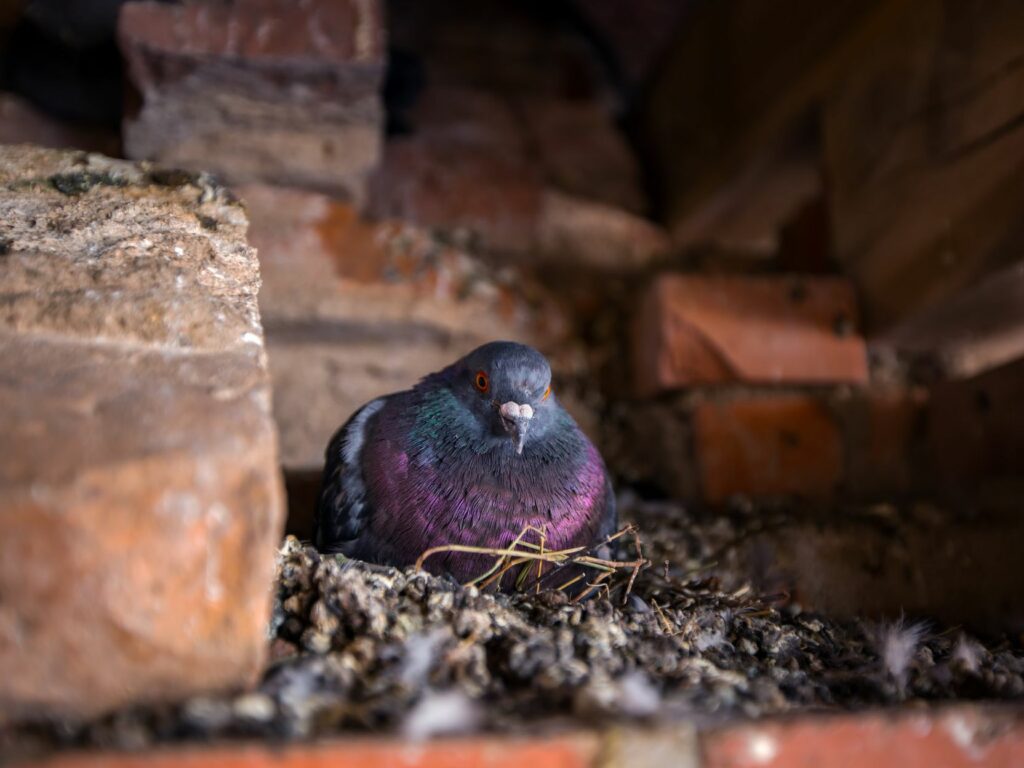
How Many Eggs Do Pigeons Typically Lay?
It might surprise you to learn that pigeons don’t lay large clutches of eggs. In fact, they usually lay only two eggs per nesting period. After the eggs are laid, both parents participate in incubating them. This process typically lasts for about 18 days, after which the pigeon chicks, also known as squabs, hatch.
This pattern of laying only one or two eggs allows the pigeon parents to give plenty of care and attention to their young. It is also an effective strategy to ensure survival. With fewer chicks to look after, pigeon parents can better protect and feed their offspring, increasing the squabs’ chances of reaching maturity.
Do pigeons lay eggs? The pigeon egg incubation process
Let’s dive into the process that follows egg-laying. Understanding how pigeons incubate their eggs and how long this process takes can offer fascinating insights into their lives and reproductive behavior.
How Do Pigeons Incubate Their Eggs?
Pigeon incubation is a team effort between both parents. After the female lays the eggs, she usually takes the first shift on the nest. The male pigeon takes over later, allowing the female to feed and rest. This pattern continues throughout the incubation period. The parent bird will sit on the eggs to keep them warm and rotate them occasionally to ensure even heat distribution.
How Long Does Incubation Take?
The incubation period for pigeon eggs typically lasts around 18 days. However, this can vary slightly depending on environmental factors such as temperature and humidity. Both parents share incubation duties in shifts during this period. After incubation, the chicks, or squabs, will hatch, marking the start of the next phase in the pigeon life cycle.
Learn more about pigeon eggs:
- What To Do With Eggs My Pet Pigeon Layed
- How Long Do Pigeon Eggs Take To Hatch?
- How Many Eggs Does A Pigeon Lay?
- How Often Do Pigeons Lay Eggs?
Post-Hatching Care of Pigeon Chicks
The process doesn’t end at hatching; let’s explore how parent pigeons care for their chicks and when the young pigeons, known as squabs, are expected to leave the nest.
How Do Parent Pigeons Care for Their Chicks?
After the eggs hatch, both parents continue to play an active role in raising the squabs. Newborn pigeons are altricial, meaning they are helpless and depend entirely on their parents for food and protection. The parents feed the squabs a substance known as ‘pigeon milk‘ – a nutrient-rich fluid produced in their crops. This continues for about a week after hatching, after which the diet shifts progressively towards adult food – typically seeds and grains.
When Do Pigeon Chicks Leave the Nest?
Pigeon chicks usually leave the nest about four to six weeks after hatching. By this time, they have grown enough to survive on their own and begin the process of learning to forage for food independently. Although they’ve left the nest, the squabs often stay close to their parents for a while before eventually going off to lead their own lives.
Learn more about baby pigeons:
Do pigeons lay eggs? Final thoughts
In conclusion, pigeons do indeed lay eggs, typically two per clutch, as an integral part of their reproduction process. From egg-laying to incubation, hatching, and caring for their chicks, pigeons are dedicated parents. This fascinating aspect of their biology is just another reason why these birds are so remarkable. Whether you’re a pigeon owner, a bird enthusiast, or simply a curious individual, understanding this process gives you a deeper appreciation of these common yet extraordinary birds.
Do pigeons lay eggs? FAQs
There are the most often-asked questions about pigeons laying eggs.
Do pigeons lay eggs?
Yes, female pigeons do lay eggs. This happens after a successful mating and fertilization process. It’s an essential part of the pigeon reproduction cycle.
How many eggs do pigeons lay at a time?
Pigeons usually lay one or two eggs per clutch. This small number allows both parents to adequately warm and protect the eggs during the incubation period.
How often do pigeons lay eggs?
In favorable conditions, pigeons can lay eggs every month. The exact frequency depends on various factors, including the availability of food and safe nesting sites.
Do pigeons lay eggs without mating?
Yes, female pigeons will lay infertile eggs even if they don’t have partners.
What time of year do pigeons lay eggs?
Pigeons do not have a specific breeding season and can lay eggs at any time of the year, provided conditions are favorable. They are prolific breeders, and in the right circumstances, they can breed year-round.
How long does it take for pigeon eggs to hatch?
Pigeon eggs typically hatch after around 18 days of incubation. Both the male and female share the responsibility of keeping the eggs warm during this period.
How do pigeons take care of their eggs?
Both male and female pigeons share the responsibility of incubating the eggs. They keep the eggs warm, turn them periodically, and protect them from predators and harsh weather conditions.
Do both male and female pigeons sit on the eggs?
Yes, both male and female pigeons take turns sitting on the eggs. This cooperative behavior ensures the eggs are always protected and kept at the right temperature for embryonic development.
What do pigeon eggs look like?
Pigeon eggs are small and elliptical, similar to a tiny chicken egg. They have a smooth, somewhat glossy surface and are usually white.
Can pigeon eggs survive without their parents?
No, pigeon eggs cannot survive without their parents. The eggs need constant warmth for the embryo inside to develop, something only the parents can provide.
Do pigeons lay eggs in the same place?
Yes, pigeons often return to the same nesting site to lay eggs if the site is safe and undisturbed. They may build a new nest or refurbish an old one.
Can you move a pigeon’s nest with eggs in it?
Disturbing a pigeon’s nest with eggs in it is not advised as it may stress the parents and lead them to abandon the nest. In some places, it’s also illegal to disturb nesting birds. If a nest is posing a problem, it’s best to contact local wildlife authorities for guidance.


